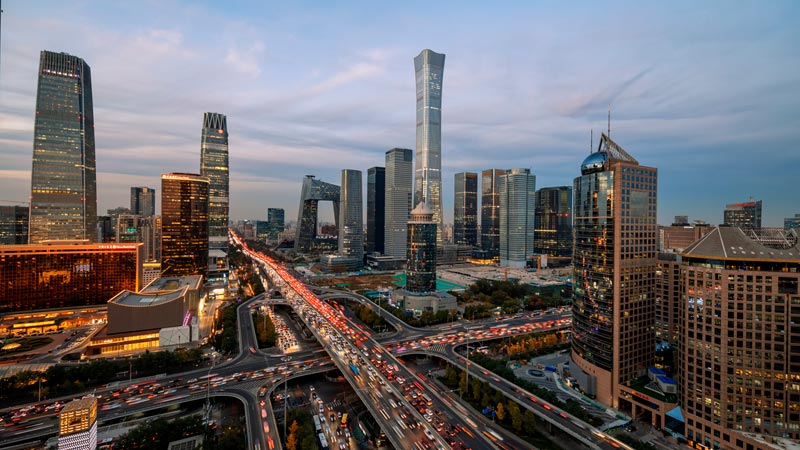Best Cities for Startups – Beijing
Asia is full of cities where startups thrive, but none of them quite matches Beijing. Coming in at No. 4 on the Startup Genome list of the best cities for startups, Beijing is known for its booming artificial intelligence (AI), big data, and fintech sectors.

Startup Genome points out that Beijing hosts more than 1,000 AI companies, about a quarter of the total in all of China. One of these is ByteDance, a unicorn valued at $95 billion and the largest privately backed startup in the world. Ten AI labs calls Beijing’s tech hub Zhongguancun home, and China is building a $2.1 billion AI technology park in the city. When it comes to fintech, Beijing’s financial sector comprises almost a fifth of its entire economy. Several fintech startups have done well, raising millions or billions of dollars.
Startup Genome estimates Beijing’s total early-stage funding at $7.5 billion, well above the global average of $431 million. Similarly, its $345 billion ecosystem value far exceeds the $10.5 billion global average. It rates the city No. 1 in ecosystem knowledge and No. 2 in ecosystem performance, noting that about 9,000 tech companies, including Lenovo, Baidu, and Sina Corp., call Beijing home.
For these and other reasons, according to a 2021 Chinese report, about 70% of the country’s potential unicorns – of which there are many – are located in Beijing and a handful of other cities. “The emergence of potential unicorn companies is an indicator of the regional innovation ecology,” the report says.
Read on for more reasons why Beijing’s startup ecosystem is one of the best in the world.
Supportive Regional and National Governments
The World Economic Forum notes that Beijing and other Chinese cities didn’t become startup hubs by accident. Rather, beginning in 1978, the national government actively sought to bring foreign investment and capital into the country through its Open Door Policy. The national government also created Special Economic Zones, as well as Guidance Funds to encourage public-private investment in AI, robotics, and other tech sectors through collaborations between central, provincial, and local governments.
Not resting on its laurels, the national government’s next five-year plan seeks to encourage growth in other tech sectors. The plan flows down to regional governments, which are trying to encourage the digitization of factories in China. “Digital transformation is one of the key targets that all governmental organizations must push to meet in the latest five-year plan,” Yuxiang Zhou, CEO of Black Lake Technologies, which provides software for factories, told the World Economic Forum. “On the entrepreneur side, government has rolled out tax and incubation policies that make it much easier to launch start-ups and accelerate their growth.”
Beijing’s regional government aims to build on the city’s startup success by introducing $2.2 billion in private capital to tech projects and paying some of the interest on startups’ loans. The municipal government is helping out as well. For example, it has offered up to $158,000 to eligible Beijing startups to help attract international talent in the AI and life sciences sectors. It also has introduced fast-track, multiple-entry visas for entrepreneurs.
Academic and Cultural Resources
Jordan Zhu, a senior manager at Innoway, noted that Beijing is blessed with excellent academic institutions that turn out some 200,000 college graduates annually. “Beijing’s great innovation asset lies in its preeminent education resources,” he told Startup Genome. He added that many of these graduates begin working for startups.
Along with enjoying a reliable pipeline of talent, startups find themselves on economically fertile ground. China has more than 1.5 billion people, which means young companies have lots of potential customers at home and don’t have to expand internationally – at least not right away. Plus, a company that establishes itself as a leader in a particular industry will probably have no trouble attracting investors.
“The size and accessibility of the large Chinese market provides attractive scale and opportunity,” Guan Wang, CEO of the AI company Learnable, told the World Economic Forum. “For example, there are over 200 million school-age students in China, compared to 50 million in the US, providing unique opportunities for start-ups in the education sector to scale very quickly. On the other hand, the Chinese start-up culture is hyper-competitive and fast, meaning it is vital to offer differentiation while being agile.”
Startups in China are also benefiting from a shift in the country’s culture toward a willingness to take more risks. In decades past, China was known for workers who focused on job security and were reticent to bet everything on a startup with a high likelihood of failure. But today’s generation of Chinese young people look at things differently. “Here in China, many are willing to take high risks and live their entrepreneur dream to the fullest,” Charles Bark, CEO of the digital health care firm Hinounou, told the World Economic Forum. “They are working with a ‘try fast and fail fast’ mindset, and function within a more flexible legal environment than in the West in terms of data privacy and security.”
Incubators and Accelerators
Beijing has several incubators and accelerators that are helping to launch startups. These include, among others:
- Tsinghua x-lab: This incubator is an education platform designed to foster student creativity, innovation, and entrepreneurship. It links 14 schools and departments across Tsinghua University, from mechanical engineering to law. By connecting various disciplines, the platform seeks to develop new ways of learning and encourage innovation.
- SparkLab Beijing: SparkLabs Beijing is an accelerator that partners with CITIC Guoan Academy, a subsidiary of CITIC Guoan Group. CITIC Group is a leading state-run financial institution in China, while Guoan Academy is the leading professional knowledge service provider in the country’s startup ecosystem. SparksLab Beijing accepts startups in a variety of sectors, including the internet of things, mobile, e-commerce, digital media, blockchain, and others. The accelerator seeks to help local entrepreneurs eventually expand internationally.
- Zhongguancun Science Park: This 488 sq km area was established in 1988 as one of China’s first science parks and national innovation demonstration centers. It hosts around 90 colleges and universities, 400 research institutions,120 labs, 90 engineering technology centers, 29 university science and technology parks, and 42 entrepreneurship parks. Some 1,800 equity investment institutions, 600 social organizations, and 300 research and development centers are also located here.
Lots of Coworking Space
Rents and real estate prices are high in Beijing, on par with San Francisco and other major startup cities. To partially compensate for this, many coworking spaces have sprung up. These spaces reduce costs for individual startups, provide fertile ground for collaboration, increase flexibility, and help make workers more productive. One of Beijing’s biggest coworking spaces is Tech Temple, sponsored by the venture capital firm Infinity Venture Partners. It covers 1,800 square meters spread over two stories and features even space, breakout and meeting rooms, and eating areas.
About the Author

An analyst of global affairs, Adriaan has an MSC from Oxford, with diverse interests in the digital economy, entertainment, and business. He is a specialist trainer in advanced analytics and media.
Startup Resources
- Learn more about Startups
- Visit the TRUiC Business Name Generator
- Check out the TRUiC Logo Maker
- Read our Business Formation Services Review
- Find Startup Ideas
- Explore Business Resources
Form Your Startup
Ready to formally establish your startup? Click below to read our review of the best business formation services!
Best Business Formation Services